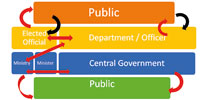Sunday Times 2
Does Sri Lanka really need a Provincial Council System?
I am very happy to note that even without some Provincial Councils in operation, Sri Lanka seems to be managing quite well with the network of public officials, even with their lethargic bungling.
 The Central Government can easily carry out policy making in all areas. Under strict guidelines the public officials can maintain and manage services within the law of the land, taking in to consideration the varying requirements of the terrain and demography, i.e. dry zone vs wetlands or catering to a more Tamil speaking public in a relevant area vs Sinhala speaking etc. After all the size of the country and demographics allow for a centrally managed system.
The Central Government can easily carry out policy making in all areas. Under strict guidelines the public officials can maintain and manage services within the law of the land, taking in to consideration the varying requirements of the terrain and demography, i.e. dry zone vs wetlands or catering to a more Tamil speaking public in a relevant area vs Sinhala speaking etc. After all the size of the country and demographics allow for a centrally managed system.
A single layer of elected local officials per electorate will have access to the public without the interference of many layers within a district and province. With transparency the requirements of the public will be communicated to the Parliament in turn. Therefore the electoral system will ensure a representative per electorate who will communicate with the Central Government and allow a free flow of accurate/timely data and information. This will eliminate the layer of “Provincial Ministers” who bully their way in to power and subsequently mete out a biased service impeding progress in most cases rather than making advances in an intelligent and comprehensive and cost effective manner.
At a juncture when the country is struggling financially, it would be prudent to eliminate all these layers of costly bureaucracy and work with the basics. Transparency of information flow and accurate data will ensue in a hierarchy which starts with the public who deserve that stature considering they work hard and pay taxes to run the country, and work through the elected official and the public official to the relevant department and subsequently the policy maker in the Central Government. The elected officials should realise their position is not to bully and dictate, but rather to gather information from the public and public officials who are experts in their relevant field and generate relevant policies with further expert advice.
The whole system is now topsy-turvy with elected officials forgetting their place in society to be a service generator to the public who pay for their services. Instead a band of thugs have taken over the local “government” and subsequently end up in parliament in turn, buying votes with threats and black money, making the parliament a three-ringed-circus at most times without consequence to their obnoxious behaviour and at great cost to the tax payer.
With an electoral system the right person will be elected by his/her public to represent them in parliament and will answer to that particular voter base from the electorate. It will in turn pave the way for educated, dedicated, intelligent public officials to apply for positions in the government service who can with their expert knowledge guide the elected officials and take this country forward. The opposite of this occurs now with public officials being the lackeys of the boorish elected officials.
Eliminating Provincial Councils will take away the might of the thug in elected public office and gradually the hardworking, result oriented public officials will return to their rightful place with a continuously improving system that embraces changes with the times, with pride in the cultural and religious diversity that is Sri Lanka where there will be no room for discrimination be it race, religion, caste or language. Let’s encourage the demand for progress without layers of bureaucracy.
So, does Sri Lanka really need a Provincial Council System?
(The writer is a tax payer and resident of Kandy)

